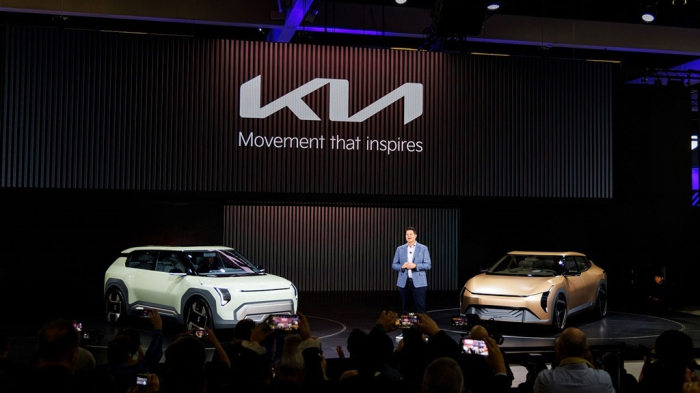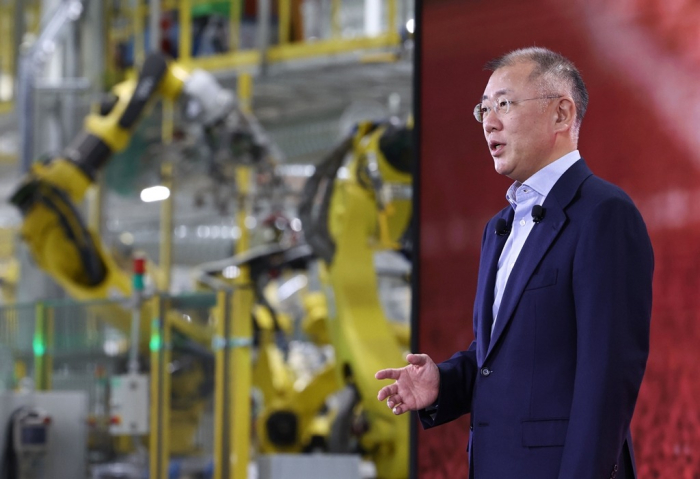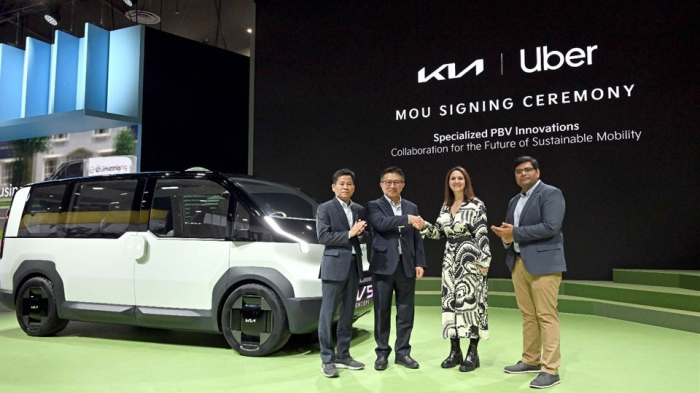Hyundai Motor Group in test run of dedicated EV plant in Korea
Kia plans to start mass production of the low-cost electric SUV EV3 in June, the electric sedan EV4 early next year
By Feb 21, 2024 (Gmt+09:00)
LG Chem to sell water filter business to Glenwood PE for $692 million


Kyobo Life poised to buy Japan’s SBI Group-owned savings bank


KT&G eyes overseas M&A after rejecting activist fund's offer


StockX in merger talks with Naver’s online reseller Kream


Mirae Asset to be named Korea Post’s core real estate fund operator



Hyundai Motor Group, the world’s No. 3 automaker, started a test operation of the first dedicated electric vehicle factory in South Korea to accelerate its electrification push despite the recent slowdown in the clean vehicle industry.
Kia Corp., the group’s automaking unit, has recently commenced the test run of the No. 2 plant in Gwangmyeong, near the capital Seoul, to produce its low-cost compact electric sport utility vehicle (SUV) EV3, according to industry sources on Wednesday.
Kia plans to start mass production of the EV3 based on the group’s proprietary Electric-Global Modular Platform (E-GMP) in June as global carmakers rushed to introduce cheaper models to offset slowing growth in clean automobiles. The company is also scheduled to manufacture the electric sedan EV4 early next year in Gwangmyeong.
The country’s second-largest carmaker shut the No. 2 plant in Kia’s Autoland Gwangmyeong in June last year to revamp it as a dedicated EV factory. The company reportedly manufactured some parts at the EV3 production line after completing the renovation works at the end of last year.
Hyundai Motor Group Chairman Chung Euisun reiterated the group’s electrification ambitions at the plant in his New Year speech.
“I am truly looking forward to the innovation of electrification, which will start from here to expand to Ulsan, the US and the global market,” Chung said on Jan. 3. Hyundai Motor Co., the group’s larger automaking unit, is building its dedicated EV factory in Ulsan about 300 kilometers (186 miles) southeast of Seoul.

TO MANUFACTURE EVS AT DEDICATED PLANTS
The group aims to manufacture EVs at its new dedicated factories for the clean vehicles.
Hyundai Motor Co. is slated to produce EV models such as the IONIQ 5 from October at its manufacturing complex in the US state of Georgia under construction.
The leading South Korean carmaker is also expected to start mass production in 2026 at the upcoming EV factory in Ulsan. The plant will manufacture premium Genesis models and large SUVs.
Kia, which is building an electric purpose-built vehicle factory in South Korea, aims to begin mass production of the mid-sized PV5 model next year.

In addition, Hyundai Motor Group opened a future urban mobility hub in Singapore to innovate its mobility research & development, manufacturing and business practices. The group is manufacturing self-driving robotaxis for test operations as well as the IONIQ 5 there.
Hyundai Motor Co. and Kia have sold 1.5 million EVs including electric models of the Genesis brand so far, which were manufactured at factories at home and abroad, which also produce internal combustion engine cars.
Once the dedicated EV plants become online, the group is likely to adjust production volumes of the existing factories, industry sources in Seoul said.
Write to Jin-Won Kim at jin1@hankyung.com
Jongwoo Cheon edited this article.
-
 Electric vehiclesHyundai breaks ground on $1.5 bn EV plant in S.Korea
Electric vehiclesHyundai breaks ground on $1.5 bn EV plant in S.KoreaNov 13, 2023 (Gmt+09:00)
4 Min read -
 Electric vehiclesKia unveils low-cost EV models to reboot sales growth
Electric vehiclesKia unveils low-cost EV models to reboot sales growthOct 12, 2023 (Gmt+09:00)
4 Min read -
 Electric vehiclesCarmakers in race for low-cost EVs amid tepid sales growth
Electric vehiclesCarmakers in race for low-cost EVs amid tepid sales growthAug 08, 2023 (Gmt+09:00)
2 Min read -
 AutomobilesKorea’s first integrated car plant being transformed into Kia’s EV base
AutomobilesKorea’s first integrated car plant being transformed into Kia’s EV baseMay 29, 2023 (Gmt+09:00)
3 Min read -
 AutomobilesHyundai to spend $18 bn on EVs; Kia breaks ground on first PBV plant
AutomobilesHyundai to spend $18 bn on EVs; Kia breaks ground on first PBV plantApr 11, 2023 (Gmt+09:00)
3 Min read -
 Electric vehiclesHyundai Motor to boost US presence with $5.5 bn new Georgia EV plant
Electric vehiclesHyundai Motor to boost US presence with $5.5 bn new Georgia EV plantOct 26, 2022 (Gmt+09:00)
3 Min read


